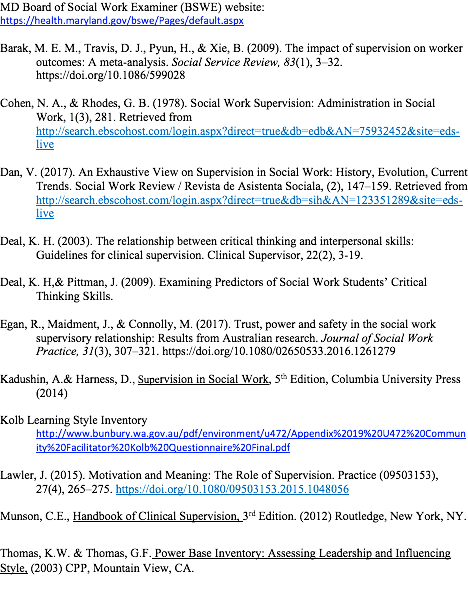Description
The beginning stage of social work intervention sets the foundation for the therapeutic relationship, establishes clear roles, and covers ethical issues and establishes professional boundaries of practice. This essential component of social work practice is further complicated by COVID-19 and when services are delivered through telehealth. The workshop will explore ethical topics and identify the new strategies to respond to the challenges which telehealth and the pandemic present. The ethical topics include Informed Consent, Rights of Minors, Establishment of a Social Media Policy, Confidentiality of Mental Health information, and Reporting Harm and Maltreatment Requirements. The workshop will also include recent National NASW guidance for telehealth and for navigating these complicated times. Ethics content covered includes: COMAR 10.42.03.03; COMAR 10.42.10; and NASW Code of Ethics (2021)
Instructor
University of Maryland School of Social Work
Gisele Ferretto, MSW, LCSW-C has over 35 years of social work experience in both clinical and macro practice areas. Her areas of expertise include: policy, professional ethics, supervision and leadership, confidentiality, social work and field practicum education, child welfare practice, and curriculum development. Ms. Ferretto provides consultation and training for private and public agencies in her areas of expertise. She has served on a variety of committees and boards at the local, state, and national level developing policy and program initiatives.
Currently, Ms. Ferretto is on the Faculty at the University of Maryland School of Social Work (SSW). During her tenure at the SSW, she has held positions in the Office of Field Education, Title IV-E Education for Public Child Welfare Program, Child Welfare Academy, Family Connections Baltimore, and Social Work Community Outreach Service (SWCOS). Prior to her time at the SSW, she served as an administrator at the Maryland Department of Human Services in the following programs: Child Protective Services, Office of Equal Opportunity, and the Office of Staff Development and Training. Ms. Ferretto began her social work career as a Child Protective Services Worker at Baltimore City Department of Social Services.
Bibliography & References
BIBLIOGRAPHY & REFERENCES
MD Board of Social Work Examiner (BSWE) website: https://health.maryland.gov/bswe/Pages/default.aspx
Barak, M. E. M., Travis, D. J., Pyun, H., & Xie, B. (2009). The impact of supervision on worker outcomes: A meta-analysis. Social Service Review, 83(1), 3–32. https://doi.org/10.1086/599028
Cohen, N. A., & Rhodes, G. B. (1978). Social Work Supervision: Administration in Social Work, 1(3), 281. Retrieved from http://search.ebscohost.com/login.aspx?direct=true&db=edb&AN=75932452&site=eds-live
Dan, V. (2017). An Exhaustive View on Supervision in Social Work: History, Evolution, Current Trends. Social Work Review / Revista de Asistenta Sociala, (2), 147–159. Retrieved from http://search.ebscohost.com/login.aspx?direct=true&db=sih&AN=123351289&site=eds-live
Deal, K. H. (2003). The relationship between critical thinking and interpersonal skills: Guidelines for clinical supervision. Clinical Supervisor, 22(2), 3-19.
Deal, K. H,& Pittman, J. (2009). Examining Predictors of Social Work Students’ Critical Thinking Skills.
Egan, R., Maidment, J., & Connolly, M. (2017). Trust, power and safety in the social work supervisory relationship: Results from Australian research. Journal of Social Work Practice, 31(3), 307–321. https://doi.org/10.1080/02650533.2016.1261279
Kadushin, A.& Harness, D., Supervision in Social Work, 5th Edition, Columbia University Press (2014)
Kolb Learning Style Inventory http://www.bunbury.wa.gov.au/pdf/environment/u472/Appendix%2019%20U472%20Community%20Facilitator%20Kolb%20Questionnaire%20Final.pdf
Lawler, J. (2015). Motivation and Meaning: The Role of Supervision. Practice (09503153), 27(4), 265–275. https://doi.org/10.1080/09503153.2015.1048056
Munson, C.E., Handbook of Clinical Supervision, 3rd Edition. (2012) Routledge, New York, NY.
Thomas, K.W. & Thomas, G.F. Power Base Inventory: Assessing Leadership and Influencing Style, (2003) CPP, Mountain View, CA.
Agenda & Learning Objectives
AGENDA:
| 09:00 |
Registration |
|
09:00-10:30
|
Lecture:
- BSWE Standards of Supervision and Scope of Practice
- Establishing Expectations: work, professionalism, ethics
- The "Space" Necessary for Ethical Conversations for Practice and Supervision
- BSWE Standards regarding ethical social work practice (COMAR 10.42.03)
- Challenges of Providing Effective Guidance
|
| 10:30 - 10:40 |
Break |
| 10:40-12:15 |
Lecture (Continued)
- The Use of Statute, Regulations, and Policy for Establishing Expectations
- Exploration of common ethical concepts: Service to Clients; Duty to Warn & Duty to Report; Client self-determination; Informed Consent; Privacy & Confidentiality; Conflicts of Interest & Multiple Relationships.
- Teachable Moments and Planned Strategies for Instruction
|
| 12:15 |
Questions & Adjournment |
LEARNING OBJECTIVES:
Upon the completion of this workshop, participants will be able to:
- Explore the functions and role of clinical supervision.
- Develop strategies to improve critical thinking and professional practice of those they supervise.
- Demonstrate an understanding to instruct supervisees on the legal authorities which govern social work practice.
- Evaluate effective strategies for setting expectations and providing effective direction.
- Review the Maryland Board of Social Work Examiners expectations and NASW’s National Standards for Supervision.
Late Fees and Refunds
Fee & Registration:
Cost is $65 and includes CE credit. Registering after July 16, 2021 will incur an additional $20 late fee. *Cancellations must be received 24 hours in advance prior to the live interactive webinar to receive a refund or a credit letter.
*All cancellations will be subjected to a $35.00 administration fee
Target Audience
Social Workers, LCPCs, and Psychologists





